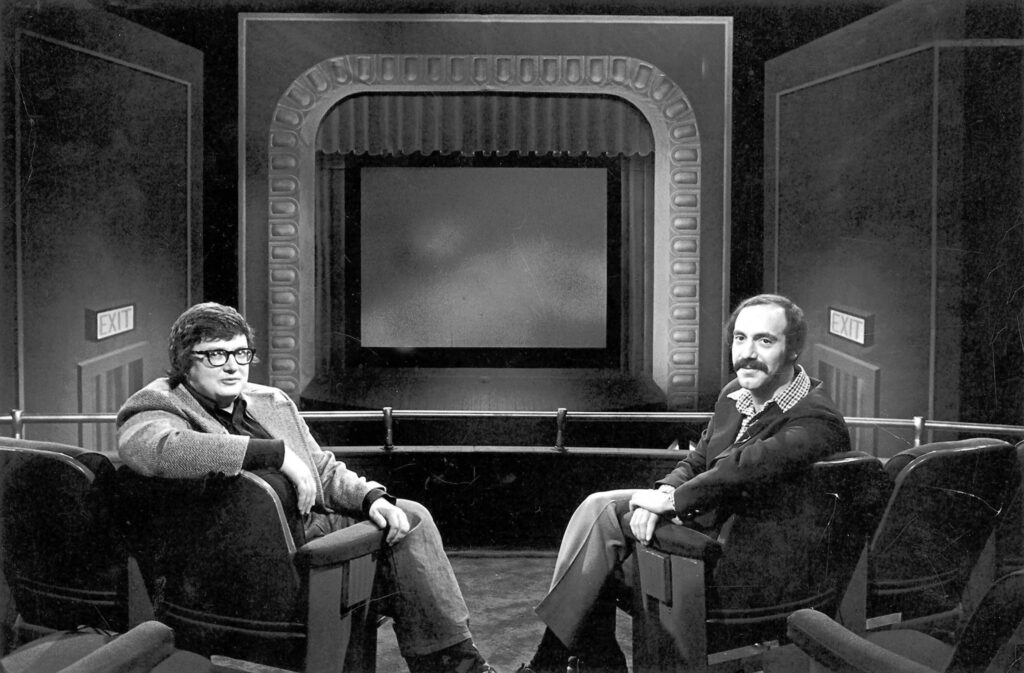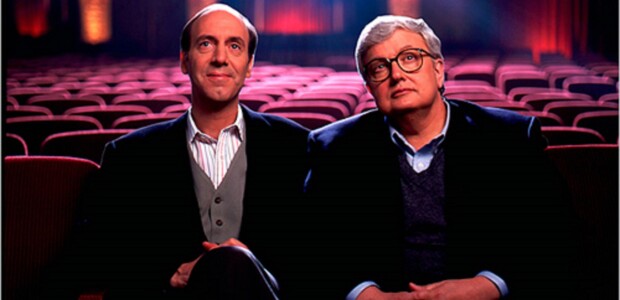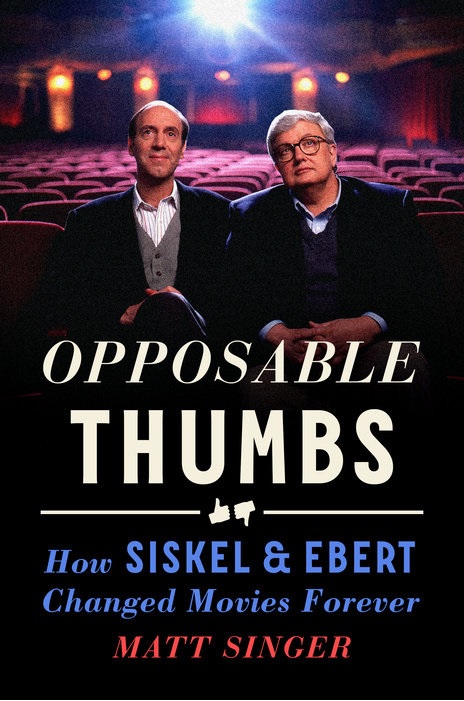Something is missing from the realm of spirited discourse. It’s hard to imagine reading about any podcaster, podcasting team, or any type of reviewer today. We lost Pauline Kael, Vincent Canby, Bosley Crowther, and really everyone before the internet showed up to destroy the world. In fact it’s rather difficult to even name a film critic today. Yet, at one point in American history, two film critics were the guides and kings of cinema: Roger Ebert and Gene Siskel.
When I first heard of Matt Singer’s new book, I thought, “How can you write a whole book about two guys reviewing movies?” Yet not only has Singer written this book, it’s crafted almost like a murder mystery. Obviously heavily researched, with input from many people in television and film, Opposable Thumbs not only gives us the history of these two men and their show’s ascent to national popularity, he also gives us the thrill of going to the movies again.
Himself a huge fan of the two critics and their show, and also later participating with Mr. Ebert in film events, Singer gives us a full illustrative picture of life before the internet, and cinema culture before television critics. Often while reading a biography it’s easy to read a section and put it down, though in Singer’s hands each move by Mssrs. Siskel and Ebert is documented as a thrilling event. More thrilling than most movies today because we simply don’t know how this is going to go, unlike the “Give them what they want” style of Hollywood today. Seriously, when you look at these two guys, how did they get to be so well known? They’re newspaper film critics. Singer elucidates their journey in such a precise manner, with quotes and remembrances from so many people in the television and news and film industries, it’s a fascinating journey that just cannot be replicated again, as the two critics here already produced the template, and upon their passing, it simply faded. As Singer documents, no one else could achieve the rivalry, and brotherhood, of these two social outcasts.
To write a proper review of Singer’s tome, it’s almost necessary to just reprint the entire book. I was taking notes myself and had to give up, there is simply too much here. Beginning each chapter with wonderful quotes by both men, we realize the personalities involved in film criticism at the time, and how this anti-friendship created an internal meditation on cinema offerings that has just bypassed almost every critic today.

Both Siskel and Ebert were vehemently against political correctness and it’s unlikely they would have survived in the tiger’s cage of the internet today. A movie now is based on the skin color, genitalia, and religious and political beliefs of its cast and creators. This was not a concern at the time of Siskel and Ebert’s growth into a national phenomenon, though they did mention it on the show several times. Film criticism has gone the way of the dinosaur, as aggregators like Rotten Tomatoes, the Internet Movie Database, and other online dragons snare the spotlight over the actual films themselves. If a critic reviews a film poorly, the fans of the movie merely give it votes. It’s hardly a way to determine a film’s value to self and society, though it’s how America works now. Doubtless we’d hear from both men about this sad decline.
Singer’s hard research has unearthed many lovely anecdotes about the duo’s climb, and overall, Siskel really had the zingers. Reading his dis of Beatle Paul McCartney and McCartney’s astonished reaction gave me a guffaw I haven’t experienced at a Hollywood comedy in decades. And Siskel offering tips to theater ushers who removed loud patrons, and a larger tip if they removed crying babies, makes you want to break out a banner for the sake of cinema.
Among the many quotes Singer offers as chapter heads includes Ebert’s notes on the genus of Akira Kurosawa’s RASHOMON: “Human beings are unable to be honest with themselves about themselves. They cannot talk about themselves without embellishing.” Fortunately for us, author Singer doesn’t bother embellishing anything about the two men. This is a warts-and-all book, which allows us the opportunity to measure the critics’ worth.
Beginning their coupled televised career with the pilot “Opening Soon,” the men just didn’t have the chops to entertain at that time. Exploring the world that was then Singer continually plumbs the reality of the time that is so difficult to comprehend for today’s viewership. You couldn’t just grab a film clip off the internet. You had to have a 35mm film print available to make clips from. Not so easy!

As a young viewer of the show, a show I would race home from wherever I was to catch and watch along with my film-loving father, when they adopted other sections to their show it really amped up the proceedings. It was one thing to learn about a new super-indie talky movie like MY DINNER WITH ANDRE, but when the pair created their ‘Dog of the Week,’ (which eventually became the ‘Stinker of the Week,’ with a friendly skunk assisting the men) made up of schlocky horror and other movies, they actually made you want to see the films. I have had it confirmed by quite a few horror fans that I SPIT ON YOUR GRAVE has become the classic it is due to the coupling’s disgust at the film. That pretty much told every teenaged horror fan in America: Seek out this film.
A lengthy section on Siskel and Ebert’s appearances on David Letterman is simply fascinating. It’s near impossible to think of a film critic appearing on anyone’s show today, podcast or otherwise. Yet they were stars to Mr. Letterman and his audience. They were loved. And yet the main thesis of Singer’s book and its title is how disparate the two men were. Now everything is about saying “Yes.” “Yes” to this promoter, “yes” to this publicist, “yes” to this studio, “yes” to this franchise. Movies are not to challenge the mind or society, they are there to gain “Yesses” from the audience. Hearing each and every mutual criticism of the dueling duo reminds us of the American mind before the internet turned film criticism into sludge.
Front-chapter quips like Roger introducing a new film with “We’ll also take a look at a new film about a friendship because a boy and a whale,” and Siskel giving the coda: “Sort of reminds me of our relationship” on national television… remarkable!
The section where Singer reminds us of both men’s appeal and ability to alter the cinema landscape with their views on Errol Morris’ almost-lost pet cemetery documentary GATES OF HEAVEN and a film that technically shouldn’t have scored with audiences at all due to modern Hollywood’s gatekeeping caste system, like MY DINNER WITH ANDRE, just keeps driving home what Siskel and Ebert did for movies. After the episode of Sneak Previews highlighting that film, the next screening sold out. And the next, and the next, and at Manhattan’s now-shuttered Lincoln Plaza Cinemas, the film stayed on their screens for a full year.
Seeing the two men debate each other’s taste on intelligence on a television program really gave film criticism its importance. Just agreeing does little for the mind. “I liked it, I didn’t like it, it sucked’” is not a film review. Debating the importance of a film does much more than tossing it off for quick humor. As Singer notes: “Siskel & Ebert wasn’t just a show that starred rivals; it was a showcase for the way rivalries could make both sides better than they were without each other. And in making each other better, they made their viewers better, and smarter filmgoers and debaters as well.”

As Singer wraps up his story, the experience reminded me of the way the Disney Museum in San Francisco has created a final room after all the magic and loving wonder of Walt Disney’s creation delights every visitor, a room where all the Disney characters are sobbing at Walt’s passing. As Gene exits the story, followed by Roger, we don’t just lose two men, we lose our national identity.
Wrapping up this heavy tome with some of the films Siskel & Ebert championed, I am surprised to find Jean-Jaques Beineix’s DIVA included. To my knowledge, that film is a benchmark. For Singer, it’s a forgotten film. Fascinating again how two people who are eruditely aware of film history can have such opposing opinions about a now-classic film.
I can’t recommend Opposable Thumbs highly enough to anyone interested in film history. I can’t think of any critic today who has any singular voice in cinema. Gene Shalit’s gone. Rex Reed, we barely hear from. An entire swath of film history has given way to podcasts and “Like” buttons and sharing for the purpose of being seen socially prudent. Siskel & Ebert were so much more than that, and Mr. Singer has documented their story and history and place in the world of cinema succinctly and lovingly. Opposable Thumbs is a must for film lovers and historians.
Tags: Books, Criticism, Critics, Film Reviews, gene siskel, roger ebert




No Comments